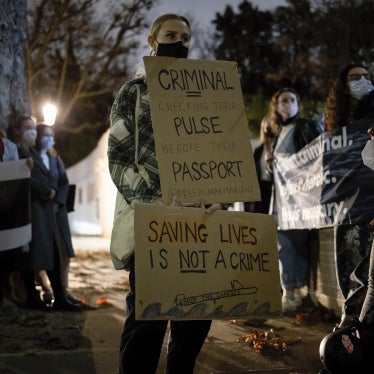Your forthcoming trip to Turkmenistan will be a key opportunity to articulate European values and expectations for engagement in Turkmenistan at a time when the government is ending the self-imposed international isolation of the Niazov era.
By making clear when you are in Ashgabad that human rights and the rule of law is a priority that affects all aspects of German policy towards Turkmenistan you would be contributing to efforts to make Turkmenistan a more suitable partner for further engagement.
The European Union’s position on cooperation with Turkmenistan
Just yesterday, the European Parliament adopted a resolution on Central Asia that upholds criteria, set out by the parliament’s International Trade Committee in November 2006, that the Turkmen government should meet before the EU can sign an Interim Trade Agreement with the Turkmen government. While these criteria are not mandatory in member states’ bilateral relations, Human Rights Watch urges your delegation to act in the spirit of common European values by making clear that Germany supports the European Parliament’s benchmarks and by urging the Turkmen government to take urgent measures to meet them.
The criteria include:
- “allowing the International Committee of the Red Cross to work freely in Turkmenistan;”
- “realigning the educational system with international standards;”
- “releasing all political prisoners and prisoners of conscience,”
- “abolishing governmental impediments to travel abroad,” and
- “allowing free access of independent NGOs and permitting the UN human rights bodies to operate freely in the country to monitor such progress.”
Steps forward
With regard to education, since coming to power President Berdymukhamedov has reinstated the 10th year of secondary education, restored the five-year course of university-level education, and held discussions with foreign governments on extensive and important educational exchanges, particularly in higher education. Also in the social sphere, he has reinstated pensions and social allowances, re-opened the Academy of Sciences and allowed the circus and opera to function, all banned by Niazov (ballet, however, remains outlawed). The government issued an invitation to one UN human rights monitor, the Special Rapporteur on freedom of religion, to visit the country.
Areas of concern
At the same time, no genuine human rights reform has taken place in Turkmenistan during the first year of Berdymukhamedov’s presidency. In a report published in November, Human Rights Watch documented the draconian restrictions on freedom of expression, association, movement, religion and belief that remain in place in Turkmenistan. Independent nongovernmental organizations (NGOs) that deal with human rights and independent media cannot function properly due to government threats and harassment. Domestic and international organizations, including the International Committee of the Red Cross, still do not have access to the Turkmen prisons.
Political prisoners
Hundreds of people, perhaps more, languish in Turkmen prisons after unfair trials on possibly politically motivated charges. Among them are Mukhametkuli Aymuradov, sentenced in 1995 to 15 years of imprisonment on politically motivated charges of anti-state crimes and sentenced again in 1998 to an additional 18 years for allegedly attempting to escape from prison; and Annakurban Amanklychev, and Sapardurdy Khajiev, who are affiliated with a Turkmen human rights group in exile, and were sentenced in 2006 seven years of imprisonment on bogus charges of possession of ammunition.
Also, the whereabouts in custody of several high profile political prisoners remain unknown. These include former Minister of Foreign Affairs Boris Shikhmuradov and former Turkmen Ambassador to the OSCE Batyr Berdyev as well as of some other defendants in an alleged 2002 assassination plot against the late Saparmurat Niazov.
Freedom of movement
While some individuals have been permitted to travel abroad, the system of foreign travel restrictions inherited from the Niazov era remains in place, and people continue to be forbidden arbitrarily from traveling abroad. For example, three months after he requested permission to travel to abroad, Andrey Zatoka, a well-known environmental activist, was told in February 2008 he was banned from travel for reasons that were not explained to him.
Another recent case is that of Rashid Ruzimatov, a relative of an exiled former government official who has been banned from travel abroad since 2003. Ruzimatov wrote to government officials four times to clarify why he was forbidden from traveling and to request that he be permitted to do so. The most recent of these efforts was in May 2007, when he sought permission to travel to Uzbekistan to attend a ceremony commemorating the anniversary of his father’s death. On June 7, 2007 he received a letter from the prosecutor general’s office stating that his “application was considered and dismissed.”
Freedom of religion and belief
As you may know, during the Niazov era severe restrictions on religion were in place. Religious believers, particularly followers of faiths other than Sunni Islam and Russian Orthodoxy, faced criminal prosecution, police beatings, deportation and, in some cases, demolition of their houses of worship.
A recent report by the United States Commission on International Religious Freedom, which travelled to Turkmenistan in August 2007, acknowledges some limited positive steps made by the new government, among them the release from prison of the former chief mufti and the government’s expressed willingness to consider reform in country’s religion law. At the same time, the report points out that a system of oppressive laws and practices remain in place, including imprisonment of “leaders or believers of peaceful unregistered religious communities whose activities are deemed “illegal.” and a “legal ban on the importation and printing of religious and other material.”
Also, the independent organization Forum 18 News Service reports that since President Berdymukhamedov took office, there has been a rise in repression of peaceful religious activities of Baptists, Protestants, and Jehovah’s Witnesses in Turkmenistan.
Human Rights Watch urges your delegation to stress the need of genuine human rights reform and to call upon the government of Turkmenistan to improve its human rights record. In particular, your delegation can urge Turkmenistan’s authorities to release political prisoners, to initiate a nation-wide transparent review of political cases of past years, to allow people to travel freely outside the country and to stop the harassment of civil society, including independent NGOs, media and religious organizations.
We thank you for your attention to the concerns in this letter.
Sincerely yours,
Holly Cartner
Executive Director
Marianne Heuwagen
Berlin Director








